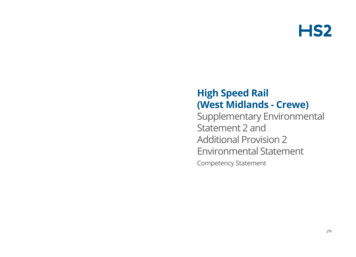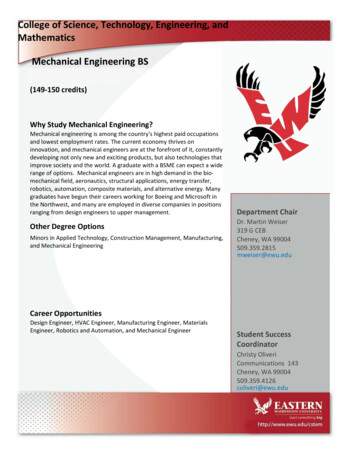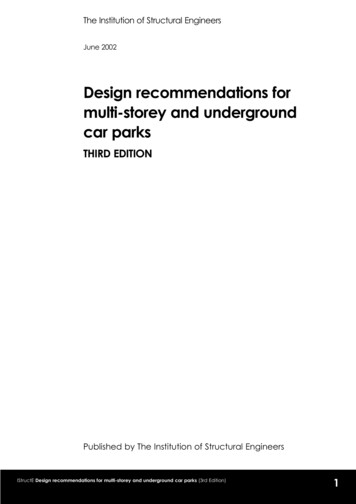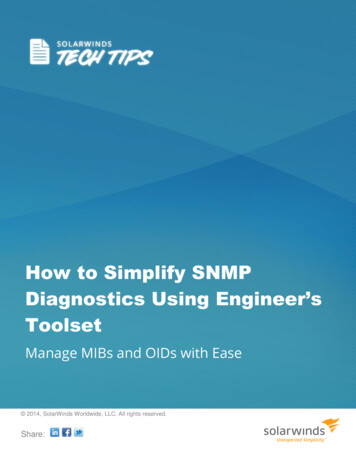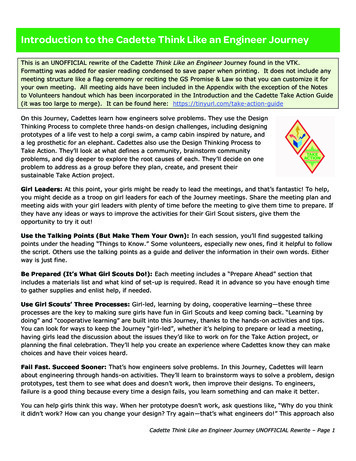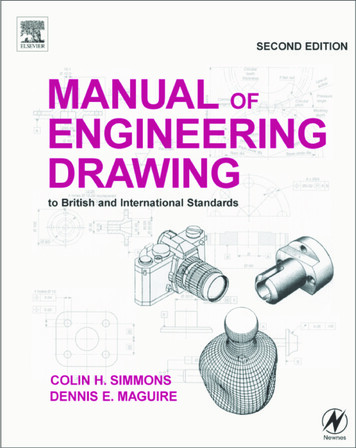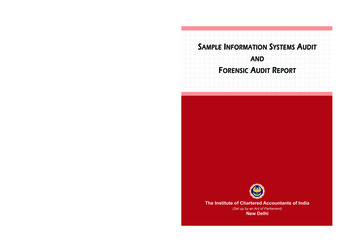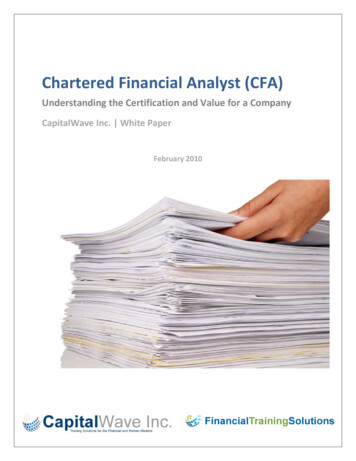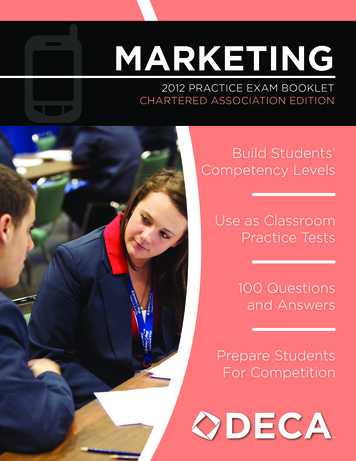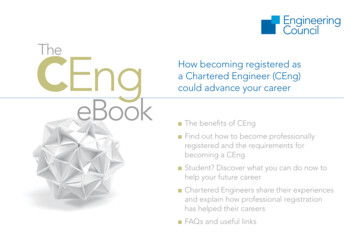
Transcription
TheeBookHow becoming registered asa Chartered Engineer (CEng)could advance your careernnThe benefits of CEng ind out how to become professionallyFregistered and the requirements forbecoming a CEngn S tudent?Discover what you can do now tohelp your future careernn hartered Engineers share their experiencesCand explain how professional registrationhas helped their careersFAQs and useful links
CEng eBookpage 2www.engc.org.ukContentsThe benefits of CEng03Serious about your career in engineering? Gain professional recognition04Eligibility05How to become professionally registered06UK-SPEC competence and commitment requirements for CEng registration07Student?08CEng case studies09FAQs13Useful weblinks14
CEng eBookpage 3www.engc.org.ukBecoming a Chartered Engineer (CEng)could advance your careerProfessional registration as a CEng not only recognises your proven commitment,skills and experience as an engineer, but also identifies to employers that you havethe competence, expertise and work ethic that they value. You will:nGain a professional title that carries considerable prestigenEnhance your employabilityn Standout from the crowd as a significant player in the world of engineeringand technologynEnjoy greater influence within the professionnEarn recognition from your peersnHold an internationally recognised qualification‘‘It is critical that my technicalability is supported with the correctqualifications, and in my opinion havingthe designation CEngis the ultimatemark of a professionalengineer’David W Millar MPhilCEng SenMWeldIent“CEng was an important achievemdicalfor me especially as having a mescience background I wanted toandprove my capabilities in materialspectengineering and therefore gain resfrom my peers”Melissa A Riley BMedSc PhDCEng MIMMM
CEng eBookpage 4www.engc.org.ukSerious about your career in engineering?Realise your potentialAre you a motivated individual with real potential?Do you possess a natural talent for problem solving through creativity and innovation?If the answer to both questions is yes then you may well have what it takes to becomeone of the elite of the engineering profession – a Chartered Engineer (CEng).Chartered Engineers are characterised by their ability to develop appropriatesolutions to engineering problems, using new or existing technologies, throughinnovation, creativity and change.They might develop and apply new technologies, promote advanced designsand design methods, introduce new and more efficient production techniques,marketing and construction concepts, or pioneer new engineering services andmanagement methods.Chartered Engineers are variously engaged in technical and commercial leadershipand possess effective interpersonal skills.“CEng registration hasstrengthened my abilityto develop solutions toengineering problems. Ithas improved my careerprospects and knowledge,as well as enriching mypersonal network.”Jeffrey YungCEng FSOE
CEng eBookpage 5www.engc.org.ukEligibilityUK-SPECIndividuals aspiring to registrationneed independent assessment oftheir competence.The UK Standard for ProfessionalEngineering Competence (UK-SPEC)provides the means to achieve this.UK-SPEC describes the value ofbecoming professionally registered asan Engineering Technician (EngTech),Incorporated Engineer (IEng) orChartered Engineer (CEng). Itdescribes the requirements that haveto be met for registration, and givesexamples of ways of doing this.CEng status is attainable through demonstration of the required professionalcompetence and commitment. These are set out in the professional standard,UK-SPEC, and are typically developed through education and work experience.There are different ways in which you can meet the requirements, on which yourinstitution will be able to advise, or please see our website for further details.Not yet ready for CEng?If you are still developing the required competences for CEng you may wish to considerIncorporated Engineer (IEng) registration first. This will allow you to enjoy the benefits ofprofessional registration earlier in your career.For more information see page 7Why wait?Apply for CEng todayby completing our enquiry form“CEng status has generally provided a means of demonstrating myprofessionalism to potential employers and been a useful source ofinformation about my career.”Gordon Paterson CEng CITP MBCS
CEng eBookpage 6www.engc.org.ukProfessional EngineeringInstitutionsHow to become professionally registered1Join a Professional Engineering Institution licensed by the Engineering Council toassess candidates for CEng registration. The institution you choose is most likelyto be one that relates to your engineering discipline or area of work.2Record your professional development. The evidence might come through academicqualifications, an employer’s training and development scheme, and/or from apersonal record showing how you gained your professional competences - guidelineswill be available from your Institution.3As soon as you feel that you are able to demonstrate the required technical andpersonal competences, apply for assessment by your Institution.Professional engineeringregistration – what’s in it for me?The Engineering Council video onYouTube explains what becomingprofessionally registered as anengineer means, the benefits to theindividual, organisations and widersociety and briefly explains how toapply for registration.There are 36 ProfessionalEngineering Institutions (PEIs),each covering specific engineeringdisciplines, so it shouldn’t be difficultfinding the right one for you.Click here for a full list ofInstitutions or go to page 14for direct links to their websites.There are also 19 ProfessionalAffiliates that have agreementswith PEIs to process registrationapplications for their members.Start earlyMany engineers join an Institutionwhile a student, or soon aftergraduation, and follow the juniorgrades through to full membershipand registration.However, it is just as beneficial toapply for Institution membershipand registration at any time in yourcareer. Professionally registeredengineers also tend to retain theirtitle throughout their working lives,and often well into retirement.
CEng eBookpage 7www.engc.org.ukUK-SPEC competence and commitment requirements for CEng registrationAn outline of the necessary competence and commitment appears below. Further details and examples of activities which coulddemonstrate that you have achieved this, can be found in the UK Standard for Professional Engineering Competence UK-SPECUK-SPEC Competence and Commitment Standard for Chartered Engineers.Chartered Engineers must be competent throughout their working life, by virtue of their education, training and experience, to:A Use a combination of general and specialist engineering knowledgeand understanding to optimise the application of existing andemerging technology.n A1 Maintain and extend a sound theoretical approach in enabling theintroduction and exploitation of new and advancing technology andother relevant developmentsn A2 Engage in the creative and innovative development ofengineering technology and continuous improvement systemsB Apply appropriate theoretical and practical methods to the analysis andsolution of engineering problems.n B1 Identify potential projects and opportunitiesn B2 Conduct appropriate research, and undertake design anddevelopment of engineering solutionsn B3 Implement design solutions, and evaluate their effectivenessC Provide technical and commercial leadership.n C1 for effective project implementationn C2 Plan, budget, organise, direct and control tasks, people andresourcesn C3 Lead teams and develop staff to meet changing technical andmanagerial needsn C4 Bring about continuous improvement through quality managementD Demonstrate effective interpersonal skills.1n D1 Communicate in English with others at all levelsn D2 Present and discuss proposalsn D3 Demonstrate personal and social skillsE Demonstrate a personal commitment to professional standards,recognising obligations to society, the profession and the environment.n E1 Comply with relevant codes of conductn E2 Manage and apply safe systems of workn E3 Undertake engineering activities in a way that contributes tosustainable developmentn E4 Carry out continuing professional development necessary tomaintain and enhance competence in own area of practiceAny interviews will be conducted in English, subject only to the provisions of the WelshLanguage Act 1993 and any Regulations which may be made in implementation of EuropeanUnion directives on free movement of labour.1
CEng eBookpage 8www.engc.org.ukStudent?Although your immediate focus will no doubt be workinghard to finish your engineering degree, it’s never too earlyto think about ‘what next?’ If you are serious about a careerin engineering the next important step in your careerdevelopment should be attaining professional registrationas an Incorporated or Chartered Engineer.“Although I have attained a numberof high level academicqualificationsI feel that CEng provides a benchmarkof my competence, providing mewith a stronger CV whenapplying forfuture vacancies”Dr Caroline Lowe BSc MSc PhDCEng MIExpEYour degree will provide an important part of what’s needed to achieveregistered status, but you will also need to develop further skills and competencesin the workplace.ssgreprotomed“CEng has alloweThere is something you can do right now to helpbeyond contract management andyour future career.calinto strategic leadership of techniProfessional registration is awarded throughmanagement. I am currently on themembership of a Professional EngineeringandExecutive Board of my companyInstitution (PEI). Many of the Institutions offerI don’t feel I would have achievedstudent membership at little or no cost, and joiningthis without CEng registration”whilst you are a student means you will have a headstart and be able to keep up with what’s happeningin your field, through the resources or employernetworking events offered by many Institutions. Youmight even meet your future employer at one of these events!Greg MarkhamCEng FIHEEM MIET MBIFMThere are 36 PEIs, each covering specific engineering disciplines, so it shouldn’t bedifficult finding the right one for you. You might even want to join more than one!In addition, many of the 19 Engineering Council Professional Affiliates haveagreements with PEIs, through which their members can become professionallyregistered.
CEng eBookpage 9www.engc.org.ukCase StudiesNikki Barker CEng MIMechE MIGEM(REGISTERED 1998)Education and qualifications: BEng Engineering Science andIndustrial Management, Liverpool UniversityWhich Institutions are you a member of? Institution of MechanicalEngineers (IMechE), Institution of Gas Engineers and Manager (IGEM)Job title: Director and Engineering ConsultantCompany: Redacre Consulting Ltd and Associate of Perspectiv LLPLength in current job: 3 yearsWhere are you based? Outside WarringtonPlease describe your current role: I currently run my ownengineering consultancy providing technical advice and training inthe gas industry.What attracted you to become registered as a CEng? Fromthe day I gained my engineering degree, my aim was to becomeprofessionally registered as a Chartered Engineer. The status andresponsibility that came with professional registration was a key driverfor me.How did you become registered as a CEng? I followed theIMechE’s ‘Monitored Professional Development Scheme’ (MPDS)which meant that I had a structured pathway that would lead to anapplication for registration at the end of it. My manager at the timeactively encouraged me to get involved in work and projects thatwould prove my engineering capability and my mentor supported methroughout the whole process.How has professional registration as a CEngbenefitted your career? Certain roles I haveheld over the years have required me to be aCEng. Now I am consulting, being professionallyregistered as a CEng, means I can work at a higher pay scale and onprojects where clients require the consulting capability of peoplethat are at the top of their profession. Networking with people inboth IGEM and IMechE has led to various projects over the last threeyears.What advice would you give someone considering professionalregistration as a CEng? I believe that all engineers and techniciansshould be professionally registered as EngTech, IEng or CEng asit can only enhance the overall status of our profession. I wouldencourage any potential registrants to find out the requirements assoon as they can; start keeping a record of work they have done,projects they have been involved in and responsibilities they havehad. This can be used as evidence when you put in your application.The support of a good mentor is hugely beneficial.What is your employer’s attitude towards professionalregistration? As I run my own consultancy, I would say it has a verypositive attitude as it is my attitude! Having said that, when I appliedfor CEng registration, I was employed by a company that also viewedprofessional registration positively.Click here to see the full case study.
CEng eBookpage 10www.engc.org.ukCase StudiesKelvin Honleung Wong BEng (Hons) MEng MPhil CEng MIFireE MSFPE(REGISTERED 2008)Education and qualifications: BEng in Mechanical Engineering andMaster of Philosophy in Mechanical Engineering from Hong KongUniversity of Science and Technology, Master of Engineering in FireProtection Engineering from University of MarylandWhich Institutions are you a member of? Institution of Fire Engineers(IFE), Society of Fire Protection Engineers (SFPE)Current job title: Senior Fire EngineerCompany: ArupLength in current job: 10 yearsApproximately how many staff are employed by your company? 1000Where are you based? Beijing, ChinaPlease describe your current role: I manage the fire engineeringbusiness in Beijing and northern part of China, and am responsiblefor a team of six fire engineers in the Beijing office.What attracted you to become registered as a CEng? I havealways recognised that professional registration as a CEng providesstatus and recognition from the engineering community. This issomething I have always strived for and in gaining CEng, I haveachieved it.How did you become registered as a CEng?Firstly, I was fortunate to work for a companythat provides and supports relevant trainingprogrammes. This together with a combinationof work experience, benefitting from mentoring from seniorengineers, CPD courses and attending part time courses enabledme to become registered.How has professional registration as a CEng benefitted yourcareer? For me, gaining professional registration as a CEng isrecognition of my engineering achievement and demonstrates thisto the wider engineering society. I have also benefited from havingincreased responsibility within the organisation as well as enjoying ahigher salary!.What advice would you give someone considering professionalregistration as a CEng? I would highly recommend professionalregistration as a CEng to any engineer working at the right level, itbrings with it respect, recognition and status.What is your employer’s attitude towards professionalregistration? Professional registration is highly recommended to allengineers within the company.Click here to see the full case study.
CEng eBookpage 11www.engc.org.ukCase StudiesDr. Ben W Watson PhD MDes (Hons) CEng CEnv MIED(REGISTERED 2007)Education and qualifications: HNC Mechanical Engineering, MDesEngineering Product Design, PhD Design TechnologyWhich Institutions are you a member of? Institution of EngineeringDesigners (IED), Design and Emotion Society (DES)Current job title: Engineering ManagerCompany: PIPS TechnologyLength in current job: 15 yearsApproximately how many staff are employed by your company? 2,800Where are you based? Southampton, UKPlease describe your current role: I am the head of engineering forPIPS Technology (a federal signal company) and I’m very proud tobe leading a world class team of engineering designers. I am taskedwith the challenge to provide vision and strategic direction for ourproduct portfolio, to innovate new, existing and emerging productapplications and technologies.My practitioner based expertise resides within the domain ofproduct/mechanical design for rugged video-imaging technologyand intelligent transportation systems. I specialise in programmemanagement for both iterative and product innovation.What attracted you to become registered as a CEng? I am keenlyaware of the value professional registration brings to an individual’sportfolio and the high regard in which it is held by employers. I joinedthe Institution of Engineering Designers (IED) as a student memberand transitioned from Incorporated Engineer (IEng) to CharteredEngineer (CEng) with the IED and the Engineering Council (EngC).How did you become registered as a CEng? I applied to becomeregistered as a CEng, via the individual route, using the technicalreport option to demonstrate the exemplifying qualifications asdetailed within EngC’s UK-SPEC. The IED assigned me a mentorwho provided excellent support and guidance throughout thewhole process.How has professional registration as a CEng benefitted yourcareer? Professional registration has demonstrated my dedicationand commitment to the engineering profession.What advice would you give someone considering professionalregistration as a CEng? I strongly believe that professionalregistration is more than just about technical competence. Beinga CEng is about being a true professional, taking into account theinterdependencies and implications of your actions, operating withprofessional pride towards quality and excellence in everything youdo. Professional registration is a way to reliably demonstrate thesequalities to colleagues and future employers.What is your employer’s attitude towards professionalregistration? When I was going through the process my employerdid not understand, and therefore recognise the value of professionalregistration. I am pleased to say that this has now changed and theyare supporting me in encouraging my team to pursue it.Click here to see the full case study.
CEng eBookpage 12www.engc.org.ukCase StudiesDr M Crina A Oltean-Dumbrava MSC MA PhD CEng FICE MRICS MCIOB(REGISTERED 2007)Education and qualifications: MSc in Civil, Industrial and AgriculturalConstruction Engineering; MA in Economics of Industry, Constructionand Transport (part-time); PhD by Research Thesis (part-time)Which Institutions are you a member of? Institution of Civil Engineers,Royal Institution of Chartered Surveyors, Chartered Institute of BuildingJob title: Senior Lecturer in Asset and Construction ManagementEmployer: University of Bradford Length in current role: 9 yearsPlease describe your current role: As well as lecturing, I am alsoa member of Senate and Chair of the Standing Committee ofAssembly. Being multi-lingual I am able to manage internationalresearch projects in the field of sustainable construction / sustainablebuilt environment research and have developed international Masterscourses, and supervised doctorates in the UK and in mainlandEurope. I am a prolific writer of academic papers and have beeninvited to present my research findings to audiences across the globe.What attracted you to become registered as a CEng? Becominga CEng and Fellow of ICE is a position that commands respect anddistinction, due to: the external independent assessment required inorder to qualify; the high standard of professional competence set bythe Engineering Council; and the national and international prestigeand recognition of the title Chartered Engineer.How did you become registered as a CEng? Whilst I had industrialexperience, I used a recent research project to demonstrate mycompetence, and applied through the Technical Report option. Myroute to chartered status started some 30 years ago in Romania whereI qualified as an engineer and proceeded to manage the constructionof several projects, among which was a complex chemical engineeringplant. However, I was drawn to teaching and was appointed Lecturerat the Technical University of Cluj-Napoca, Romania where I was ableto pursue my interest in teaching and research.How has professional registration as a CEng benefitted yourcareer? It has strengthened my links with the industry and openedup many opportunities. These include: working on several researchand Knowledge Transfer projects; contributing to the activity of theBuilt Environment Skills Alliance Higher Education Strategy DeliveryGroup, and of the ‘ConstructionSkills’ Skills Provision SteeringCommittee; appointment as the first woman chair of the Associationof Civil Engineering Departments; membership of various internationalorganisations including the Association of Women in Science andEngineering; consultancy to several major engineering companies;and election to the Joint Board of Moderators visiting panel.What advice would you give other academics consideringprofessional registration? The perception among many academicsis that if they do not have industrial experience and have not workedon major projects in the industry, they cannot provide the necessaryevidence to demonstrate their competence. This is not true. Anyactive academic researcher who is involved in research or KnowledgeTransfer projects can demonstrate their competence, even if theyhave no industrial experience. However, what they need to have areproficient industrial mentors to guide them through the process.What advice would you give your students on professionalregistration? I try to motivate them to aspire to CEng status and joinan engineering institution. Sandwich course students can often usetheir placement year in the industry towards professional registrationwith the Engineering Council, which provides the crucial foundationto a stimulating career as a Chartered Engineer.Click here to see the full case study.
CEng eBookpage 13www.engc.org.ukFAQsHow much is registration and how do I pay?There will be the initial joining fee, and the annual registration fee.Amounts vary depending on your level of registration, and may berevised annually. Current Engineering Council registration fees canbe found here and are paid via the Institution you are registeredthrough. Please note that you will also have to pay fees to join andretain membership of your chosen Institution. A few Institutions alsosurcharge Engineering Council fees.Does membership of an engineering institution automaticallyqualify me for registration?No. Institutions offer a variety of membership grades. Some gradesenable members to apply for registration, others do not, so pleasemake sure your chosen Institution knows you wish to apply forprofessional registration. In addition, you will always need to gothrough the assessment process before being registered with theEngineering Council.I can’t afford the time away from work to study.How can I become registered?New flexible work-based Bachelors and Masters degrees inProfessional Engineering have been developed, which lead toIEng or CEng status. These provide the opportunity to learn whileearning, making IEng and CEng status achievable for all eligiblepractising engineers. Tailored programmes, designed around UKSPEC, integrate learning in the workplace with supervised workbased professional development. More details can be found ering-gatewaysDo I need to be a member of an Institution or can I registerdirectly through the Engineering Council?The Engineering Council does not offer direct registration.Candidates for professional registration are required to be inmembership of a licensed Institution or a Professional Affiliate withthe relative agreement.What is an accredited degree?Accredited degrees partially or fully satisfy the educationalrequirement for IEng and CEng registration.How do I find out if my degree is accredited?The Engineering Council has a searchable database of engineeringdegrees that have been accredited by one or more of theProfessional Engineering Institutions. The database can be found at:http://www.engc.org.uk/coursesCan I use my international qualifications to register?Yes. The Engineering Council is the UK signatory to a number ofinternational accords - agreements which provide a mechanismfor mutual recognition between signatory bodies of engineeringeducation accreditation processes. Further details can be foundhere or through the International Engineering Alliance.I have gained a qualification outside the UK. Is there a UK equivalent?Please contact UK NARIC, the national agency responsible forproviding information and advice about how qualifications and skillsfrom overseas compare to the UK’s national qualification frameworks.
CEng eBookpage 14www.engc.org.ukUseful weblinksEngineering CouncilProfessional Engineering InstitutionsEngineering Council WebsiteBCS, The Chartered Institute for IT (BCS)Institution of Civil Engineers (ICE)EngTechBritish Institute of Non-Destructive Testing(BINDT)Institution of Engineering and Technology (IET)Chartered Institute of Plumbing and HeatingEngineering (CIPHE)Institution of Fire Engineers (IFE)IEngCEngEngineering Council NewsletterInternational recognitionof UK qualificationsUK-SPECChartered Institution of Building ServicesEngineers (CIBSE)Chartered Institution of Highways &Transportation (CIHT)Institution of Engineering Designers (IED)Institution of Gas Engineers and Managers(IGEM)Institution of Lighting Professionals (ILP)Institution of Mechanical Engineers (IMechE)Chartered Institution of Water andEnvironmental Management (CIWEM)Institution of Railway Signal Engineers (IRSE)Energy Institute (EI)Institution of Structural Engineers (IStructE)Institute of Acoustics (IOA)Nuclear Institute (NI)Institute of Cast Metals Engineers (ICME)Royal Aeronautical Society (RAeS)Work-based degreesInstitute of Healthcare Engineering & EstateManagement (IHEEM)Royal Institution of Naval Architects (RINA)Registration enquiry formInstitute of Highway Engineers (IHE)International Engineering AllianceInstitute of Marine Engineering, Science andTechnology (IMarEST)Accredited course searchBenefits of registrationInformation for employersInformation for studentsProfessional AffiliatesInstitute of Materials, Minerals and Mining(IOM3)Institute of Measurement and Control (InstMC)Institute of Physics (IOP)246 High Holborn, London WC1V 7EXInstitute of Physics & Engineering in Medicine(IPEM)Institute of Water (IWater)T 44 (0)20 3206 0500Institution of Agricultural Engineers (IAgrE)F 44 (0)20 3206 0501Institution of Chemical Engineers (IChemE)Institution of Royal Engineers (InstRE)Society of Environmental Engineers (SEE)Society of Operations Engineers (SOE)The Institution of Diesel and Gas TurbineEngineers (IDGTE)The Welding Institute (TWI)
marketing and construction concepts, or pioneer new engineering services and management methods. Chartered Engineers are variously engaged in technical and commercial leadership and possess effective interpersonal skills. “CEng reg
